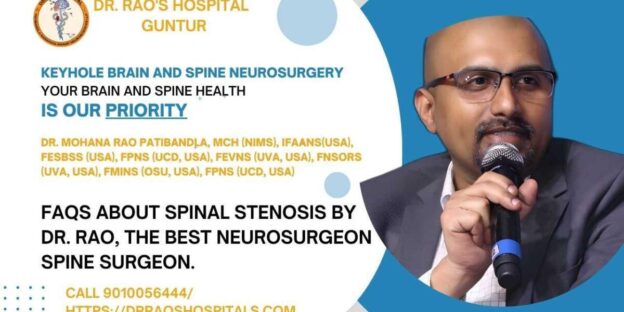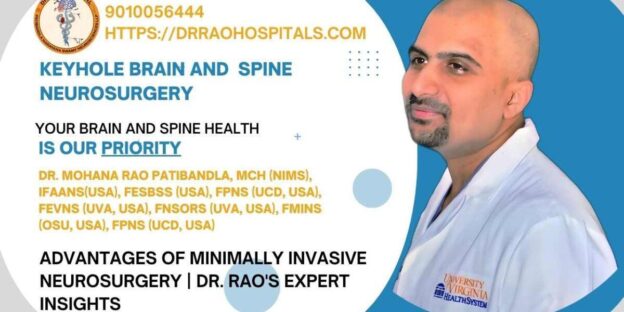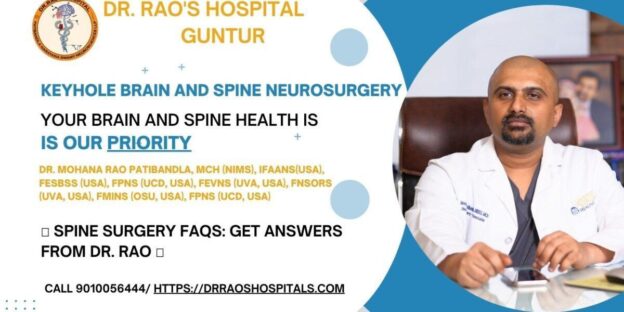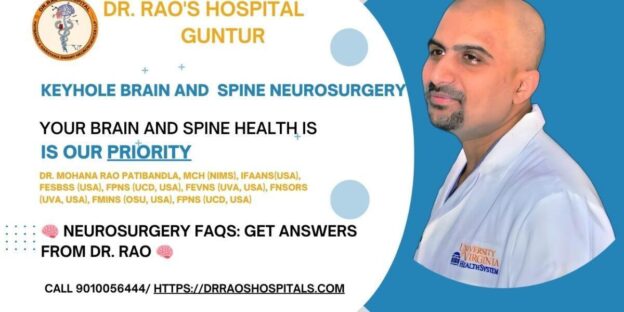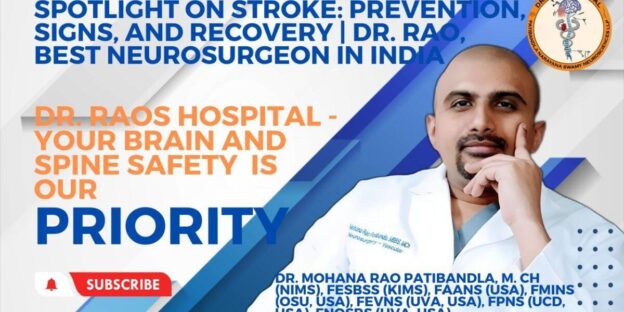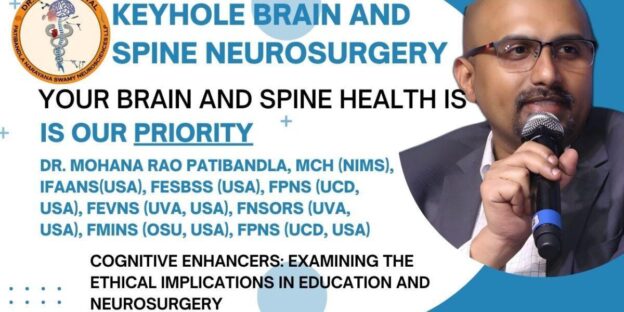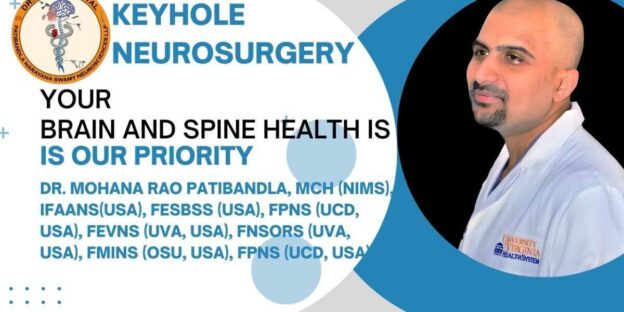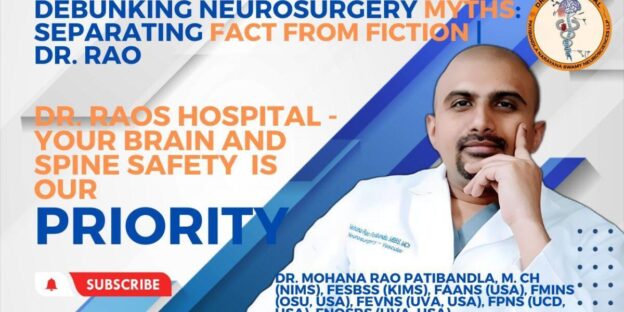Frequently Asked Questions (FAQs) About Spinal Stenosis
Summary: Explore our Spine Stenosis FAQ with Dr. Rao, a distinguished neurosurgeon, as he provides expert answers and valuable insights on managing spine stenosis. Gain a better understanding of this condition and discover practical solutions at Dr. Rao’s Hospital.
- What is spinal stenosis?
- Spinal stenosis is characterized by the narrowing of the spaces within the spine, which puts pressure on the spinal cord and nerves.
- What are the common symptoms of spinal stenosis?
- Common symptoms include back pain, leg pain, numbness, weakness, and difficulty walking or maintaining balance.
- How is spinal stenosis diagnosed?
- Diagnosis is based on a thorough physical examination, medical history review, and imaging tests such as MRI, CT scan, or X-ray.
- What are the leading causes of spinal stenosis?
- Spinal stenosis is often caused by age-related degeneration of the spine, including herniated discs, bone spurs, and thickened ligaments.
- Can spinal stenosis be treated without surgery?
- Sometimes, non-surgical treatments like physical therapy, medications, and injections can effectively manage the symptoms.
- When is surgery recommended for spinal stenosis?
- Surgery is typically recommended when non-surgical treatments have failed to provide relief and symptoms significantly impact daily life.
- What surgical options are available for spinal stenosis?
- Surgical options include laminectomy, laminotomy, and foraminotomy, which aim to relieve pressure on the affected nerves.
- Is spinal stenosis a curable condition?
- While spinal stenosis cannot be cured entirely, proper management and treatment can significantly improve symptoms and quality of life.
- What is the recovery period after spinal stenosis surgery?
- Recovery time varies depending on the type of surgery performed and the individual patient, but it generally takes several weeks to months to fully recover.
- Are there any risks associated with spinal stenosis surgery?
- As with any surgery, infection, bleeding, nerve damage, and anesthesia-related complications are risks. However, these risks are minimized with a skilled neurosurgeon.
- Can spinal stenosis recur after surgery?
- In some cases, spinal stenosis may recur after surgery. Regular follow-up appointments and adherence to postoperative care are essential to minimize the risk of recurrence.
- Is physical therapy necessary after spinal stenosis surgery?
- Physical therapy is an integral part of recovery after spinal stenosis surgery. It helps improve strength, flexibility, and mobility.
- Can lifestyle changes help manage spinal stenosis symptoms?
- Yes, lifestyle changes such as maintaining a healthy weight, regular exercise, and good posture can help manage symptoms and prevent further progression.
- Can spinal stenosis lead to permanent disability?
- If left untreated or inadequately managed, spinal stenosis can lead to progressive nerve damage and permanent disability. Early diagnosis and treatment are crucial.
- Is minimally invasive spine surgery available for spinal stenosis?
- Yes, minimally invasive spine surgery is an option for some patients with spinal stenosis. It offers smaller incisions, reduced recovery time, and less tissue damage.
- Can spinal stenosis affect bowel and bladder function?
- In severe cases, spinal stenosis can compress nerves that control bowel and bladder function, leading to incontinence. Immediate medical attention is necessary.
- Can chiropractic care help with spinal stenosis?
- Chiropractic care may temporarily relieve some patients with spinal stenosis, but it is essential to consult a neurosurgeon for a comprehensive evaluation.
- Can nerve blocks provide pain relief for spinal stenosis?
- Yes, nerve blocks may temporarily relieve spinal stenosis by blocking pain signals from affected nerves.
- How can I prevent spinal stenosis?
- Maintaining good posture, exercising regularly, and avoiding excessive strain on the spine can help reduce the risk of developing spinal stenosis.
- Why should I choose Dr. Rao’s Hospital for spinal stenosis treatment?
- Dr. Rao’s Hospital is a renowned neurosurgery hospital with highly skilled neurosurgeons, state-of-the-art facilities, and personalized patient care. We have a proven track record of successful spinal stenosis treatments, ensuring the best possible outcomes for our patients.
Choosing Dr. Rao’s Hospital for Minimally Invasive Spine Surgery

- Expertise: Dr. Rao’s Hospital boasts a team of highly skilled and experienced neurosurgeons led by Dr. Mohana Rao Patibandla, a renowned neurosurgeon with expertise in minimally invasive techniques.
- Minimally Invasive Approach: The hospital specializes in minimally invasive neurosurgery and spine surgery, which offer smaller incisions, reduced scarring, quicker recovery, and less post-operative pain compared to traditional open surgeries.
- Advanced Technology: Dr. Rao’s Hospital has state-of-the-art technology and cutting-edge equipment to perform minimally invasive procedures with precision and accuracy.
- Comprehensive Care: The hospital provides comprehensive care for patients with various neurological conditions, including spine disorders, brain tumors, epilepsy, and more.
- Personalized Treatment: Each patient’s condition is thoroughly evaluated, and treatment plans are customized to meet individual needs, ensuring the best possible outcomes.
- High Success Rates: Dr. Rao’s Hospital has a proven track record of successful outcomes in minimally invasive neurosurgery and spine surgery, making it a trusted choice for patients seeking effective treatments.
- Multidisciplinary Team: The hospital has a multidisciplinary team of specialists, including neurologists, radiologists, and physical therapists, working together to provide comprehensive care throughout the patient’s journey.
- Patient-Centric Approach: Dr. Rao’s Hospital strongly emphasizes patient satisfaction, ensuring patients receive compassionate care and support throughout their treatment process.
- Holistic Care: The hospital believes in a holistic approach to treatment, addressing not only the physical aspects of the condition but also the emotional and psychological well-being.
- Accredited Facility: Dr. Rao‘s Hospital is a reputable and accredited healthcare facility, adhering to the highest quality and patient safety standards.
- International Patients: The hospital has experience treating international patients and assists with travel, accommodation, and language translation services.
- Positive Reviews: Dr. Rao’s Hospital has garnered positive reviews and testimonials from satisfied patients who have experienced successful outcomes under their care.
Conclusion
Dr. Rao’s Hospital is a leading choice for minimally invasive neurosurgery and spine surgery due to its expertise, advanced technology, personalized care, and high success rates. With a patient-centric approach and a dedicated team of specialists, the hospital provides comprehensive and effective treatment options for patients seeking relief from neurological conditions.
Tags: Spine Stenosis, FAQ, Dr. Rao, Dr. Rao’s Hospital, Neurosurgery, Back Pain, Spinal Health, Minimally Invasive Surgery, Spine Conditions, Neurological Disorders, Chronic Pain

